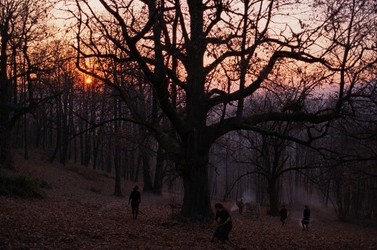There have been some hugely interesting films from around Europe recently, which deal with the way characters are anchored to their environments, and how their homes sculpt them as people. There is often an element of folk tale, and such is the case with Gregor Bozic’s Stories from the Chestnut Wood, which is both specific in focus and dreamy in execution. Like the Estonian villages of Rainer Sarnet‘s November, Nuri Bilge Ceylan‘s Anatolia, or the remote Polish forests of Adrian Panek‘s Werewolf, Bozic, through the poetic use of tone reckons with ideas of nationhood and identity, rather than through conventional narrative.
Marco (Massimo De Francovich), the ‘Stingy Carpenter’ we’re informed by an intertitle, is an old man who lives in a village in a region of the former Yugoslavia bordering Italy. He’s an irascible, irritable man who talks harshly to his ailing wife. One day he meets Marta (Ivana Roscic), who is the ‘Last Chestnut Seller’, and has lived alone since her husband failed to return from World War II. The films tells their stories and how they’re haunted by their memories.
The title suggests a collection of stories for children, or perhaps Dylan Thomas. There is certainly a fairy tale aspect – you wouldn’t be surprised to find a girl in a red hood traipsing through this forest – but it’s memory that waits with bared teeth for the unwary traveller. Melancholy blankets the film like the thick carpet of Autumn leaves.
Bozic’s film seems to exist in a liminal space between eras, between countries, even between phases of time itself. The effect is disconcerting, and gives this controlled, contained work the off-kilter cadence of freeform jazz. The setting is Yugoslavia but much of the dialogue is Italian, which shatters the mental wall we have between Western and Eastern Europe. It’s set in the 1950s but feels removed from time, heightening the fairy tale atmosphere. Horse and cart is still the main mode of transport for example. The chronology of the film is also not at all clear. There are repeated shots of Marco travelling on a wagon with two young women intercut with scenes with his wife or Marta. To piece it together requires time and patience. Bozic perhaps intends this as a representation of the function of memory, which is a fractured mosaic rather then a pristine mural.
Stories From the Chestnut Woods is a glacial picture that tells its story in the most elliptical way possible. Bozic is far more interested in the mood and tone, and the best approach is to simply surrender to the arresting 35mm cinematograph and the curiously incongruous theremin-driven electronic score. There is a fragile beauty throughout, and some images such as Marco measuring his dying wife for her coffin are truly haunting. It may be more enjoyable to ponder afterwards than it is to watch and is unapologetic in its skewed vision, jumbled timelines and all. However, lovers of ‘slow cinema’ will find much in which to invest.
As part of Glasgow Film Festival 2020
